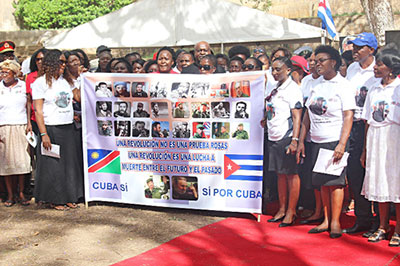
Vol. 81/No. 2 January 9, 2017
(front page)
Cuban solidarity has been ‘extraordinary’
Namibian envoy speaks on Fidel Castro at UN

Scott, deputy permanent representative at Namibia’s U.N. Mission, was one of nearly 30 speakers representing national governments and global and regional organizations of more than 100 countries, who paid tribute to Castro and the Cuban Revolution’s internationalism. Peter Thomson, ambassador of Fiji and president of the General Assembly, chaired the event, with the overwhelming majority of participants coming from Africa, Asia and Latin America.
The meeting highlighted Washington’s failure to isolate Cuba in the world. Speaker after speaker pointed to Castro’s political leadership on a global scale and hailed the solidarity extended to their peoples over decades.
The number of representatives from Africa was particularly striking. Like Scott, they stressed the decisive importance of the 425,000 internationalist Cuban volunteers during their 16-year mission aiding the people of Angola and Namibia fighting apartheid South Africa. The volunteers were instrumental in consolidating Angola as a sovereign state, winning Namibia’s independence in 1990, Nelson Mandela’s release the same year and the subsequent dismantling of the apartheid state.
“It’s no coincidence that Nelson Mandela made his first foreign visit to Cuba,” said Ambassador Yemadaogo Eric Tiare from Burkina Faso, representing the African Group at the U.N.
Speakers pointed to Cuba’s achievements in health and education and many of them described Cuban medical missions in their own countries. They pointed out that Cuba extended this solidarity despite Washington’s political and economic war against the island and called for lifting the ongoing U.S. embargo.
“This would be the greatest homage we could pay to Fidel,” Tiare said.
Several speakers highlighted the Cuban government’s swift response when the Ebola epidemic hit West Africa in 2014. As soon as the request for aid came from the World Health Organization, the Cuban government issued an appeal for trained medical personnel. Within three days, more than 12,000 volunteered. Of these, 256 were selected and trained. When they arrived in Sierra Leone, one of the hardest hit countries, the mortality rate was 80 percent. The treatment they helped provide brought it down to less than 30 percent.
“The timely intervention of Cuba helped save the lives of many people,” Sierra Leone’s U.N. Ambassador Vandi Chidi Minah told participants.
“He raised the flag of the Non-Aligned Movement,” said Rafael Ramírez Carreño, Venezuela’s U.N. ambassador, one of many who spoke to Castro’s leadership of this movement, championing the call for cancellation of the mainly African, Asian and Latin American member countries’ debt to Washington and other imperialist exploiters.
Cuba was one of 25 founding members at the Non-Aligned Movement’s summit in Belgrade, Yugoslavia, in 1961, two years after the victory of the revolution. In a blow to the U.S. rulers’ attempts to isolate Havana, the movement opposed Washington’s embargo, its military occupation of the Guantánamo Naval Base and affirmed Cuba’s right to determine its own future. Castro served as the movement’s chairman from 1979 to 1983 and again from 2006 to 2008.
Related articles:
‘Cuban soldiers gave their lives for our independence’
Cuban Revolution was ‘guide to a lifetime of action’
Front page (for this issue) | Home | Text-version home